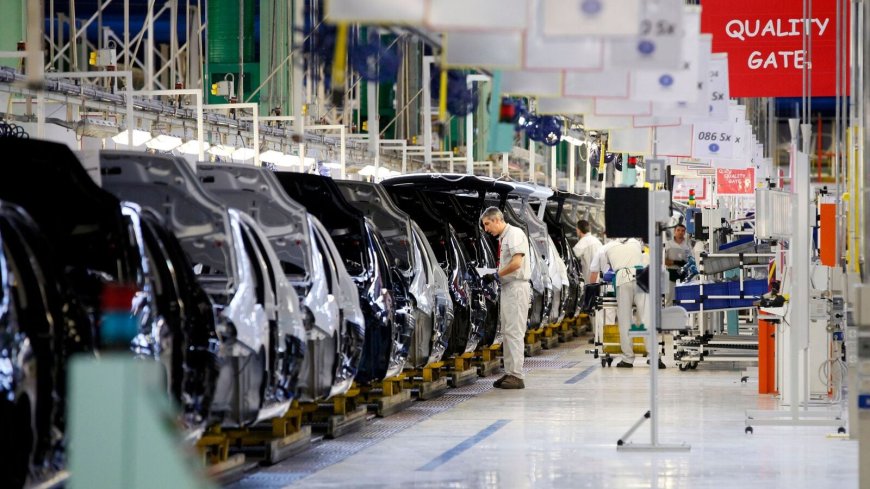Eicher, Maruti to TVS Motor: Auto Stocks Jump up to 2% on Reports India May Turn to Australia for Rare-Earth Magnets
Eicher, Maruti, TVS Motor and other auto stocks rose up to 2% as India considers sourcing rare-earth magnets from Australia. This move could strengthen the EV supply chain and reduce reliance on China.

In a market-moving development, shares of leading Indian automobile manufacturers rallied up to 2% in early trade on Wednesday, following reports that India is exploring a partnership with Australia to secure supplies of rare-earth magnets. This potential alliance is seen as a strategic move to reduce dependency on China for critical materials used in electric vehicles (EVs), amid intensifying efforts to localize supply chains in the automotive sector.
Auto Stocks Shift Gears on Strategic Supply Developments
Stocks of major automakers such as TVS Motor Company, Eicher Motors, Maruti Suzuki, Tata Motors, and Bajaj Auto witnessed a notable uptick on the National Stock Exchange (NSE). TVS Motor and Eicher Motors were among the top gainers, rising around 2%, while Maruti and Tata Motors gained over 1% each. This rally came as optimism surged on India’s proactive efforts to secure critical inputs essential for next-generation vehicle production.
Shares of auto ancillary companies, especially those involved in EV component manufacturing, also gained ground, reflecting broader market confidence in the sector’s long-term prospects.
Rare-Earth Magnets: The Hidden Engine of the EV Revolution
Rare-earth magnets, primarily neodymium and praseodymium magnets, are vital components in EV motors, wind turbines, and other advanced technologies. Currently, China accounts for over 80% of the global rare-earth magnet supply, posing a significant geopolitical risk for nations heavily reliant on these resources.
In this context, India’s reported negotiations with Australia—home to one of the world’s largest reserves of rare-earth minerals—mark a critical step in de-risking the EV manufacturing supply chain.
“The move towards Australia is a positive signal to investors that India is serious about building a self-sufficient EV ecosystem,” said Ankit Jain, Senior Analyst at ICICI Securities. “Auto manufacturers will benefit from more predictable and transparent sourcing of essential inputs.”
Government-Backed Strategy to Bolster EV Ecosystem
Sources indicate that India is considering forming joint ventures and signing long-term contracts with Australian firms to secure supplies of rare-earth elements and set up magnet manufacturing units locally. The initiative aligns with the Indian government's broader production-linked incentive (PLI) schemes for advanced cell chemistry and auto components.
“The strategic collaboration with Australia not only enhances energy security but also supports India's clean mobility goals,” said Dr. Kavita Rao, an economist with the National Institute of Public Finance and Policy. “It’s a signal to global markets that India is future-proofing its auto sector.”
Market Context: A Buoyant Auto Sector
The auto sector has been among the outperformers in 2025, supported by strong domestic demand, an uptick in exports, and increased investments in electric mobility. In the past six months, Nifty Auto has surged over 20%, outperforming the broader indices.
In Wednesday’s session, the positive news around rare-earth magnets provided another boost to investor sentiment, which has been buoyant thanks to robust quarterly earnings from auto majors and improved semiconductor availability.
Analyst Reactions and Sector Outlook
Market participants see the rare-earth development as a long-term catalyst rather than a short-term spike. "This news has the potential to structurally lower the cost of EV manufacturing in India over the next 5–10 years," said Harshvardhan Tiwari, Auto Sector Strategist at JM Financial. "Reduced dependence on imports will not only enhance margins but also increase India's appeal as an export hub."
However, experts also caution that establishing domestic magnet manufacturing will require large capital investments and technology transfers, which could take several years to materialize. Yet, the direction of policy has clearly enthused investors.
EV Leaders Likely to Gain the Most
Companies already betting big on electric mobility—such as Tata Motors, TVS Motor, and Hero MotoCorp—stand to benefit significantly from this strategic shift. With the cost of EV motors largely influenced by magnet inputs, supply-side diversification could directly impact product pricing and market competitiveness.
Additionally, companies like Bharat Forge, Sona BLW, and Samvardhana Motherson, which supply critical EV components, are expected to witness positive spillovers as raw material access becomes more assured and localized.
Investor Takeaway
While the partnership with Australia is still at the discussion stage, the market response underscores the strategic importance of rare-earth minerals in shaping the future of India’s auto industry. Investors appear to be pricing in both the near-term sentiment boost and the longer-term structural advantages of securing critical EV inputs.
Given India’s fast-evolving EV landscape and government focus on clean energy, such moves could well define the next decade of growth in the auto sector. As the blueprint for EV supply chain independence becomes clearer, auto stocks are likely to remain in investor focus, particularly those with aggressive electrification strategies.
What's Your Reaction?
 Like
0
Like
0
 Dislike
0
Dislike
0
 Love
0
Love
0
 Funny
0
Funny
0
 Angry
0
Angry
0
 Sad
0
Sad
0
 Wow
0
Wow
0













































































